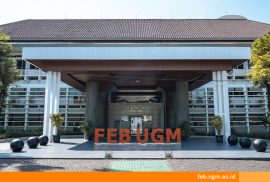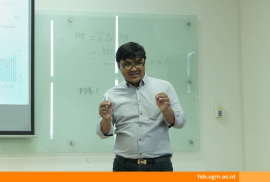With its new mission, UGM’s Faculty of Economics and Business (FEB) is committed to supporting sustainable development goals (SDG). This support is manifested in various educational, research and community service activities.
One of the steps taken by FEB UGM was to direct all tri-dharma activities to support sustainable waste management. These activities are included in the sustainable development goals, especially point 12, namely a form of responsibility for consumption and production that has been carried out. This is because the waste produced is, among other things, from the remainder of the consumption process, and then from the results of waste processing, environmentally friendly circular economy practices can be implemented through sustainable principles.
Dean of FEB UGM, Prof. Dr. Didi Achjari, S.E., M.Com., AK., CA., said that FEB UGM has launched innovative programs to encourage awareness and participation of students, lecturers and professional staff to realize a green economy on campus. One of the initiatives taken to support green economic development is implementing a sustainable culture through waste management in the campus environment.
Various waste management strategies have been successfully implemented to reduce the negative impact of waste on the environment. Existing programs not only focus on efforts to reduce waste but also on reusing waste as a valuable economic resource.
“FEB UGM develops innovative programs in waste management as a concrete step in supporting sustainability aspects. “The steps taken are part of our commitment to implementing a sustainable culture and creating positive changes that start from the campus environment and have a societal impact on society,” he explained.
Several strategic programs have been successfully implemented regarding waste management at FEB UGM, including processing organic waste into fertilizer to make biopores in the campus environment. Apart from that, FEB UGM also encourages reducing plastic waste by encouraging personal drinking water flasks (tumblers) for its residents and providing free refills of drinking water through water fountains. This policy aligns with the spirit of reducing plastic waste from the consumption of beverage bottles in packaging that is difficult to decompose and damages the environment. The recommendation for using tumblers is supported by the water fountain facility from the UGM Drinking Water Supply System (SPAM).
FEB UGM has yet to completely separate from using plastic in its campus activities. However, several concrete steps have been implemented to manage the plastic waste produced, one of which is through the movement to sort waste according to type. Through this movement, waste management on campus has become more effective. Students, lecturers and professional staff at FEB UGM are encouraged to separate organic, non-organic and recyclable waste. Existing organic waste is processed into fertilizer, while inorganic waste, including plastic waste that can be recycled, is collected for resale, the results of which are used to support social activities within the campus environment.
Another innovative step FEB UGM takes is managing food waste from the campus canteen to be used as animal feed. Waste from the canteen is processed into feed for fish and poultry for the FEB UGM community. This effort is a step that can create added value from products that were previously considered waste into something powerful and valuable.
Support from FEB UGM Community and Professional Staff
The steps taken by FEB UGM received positive support from students and campus staff. One of them is the Management Department Lecturer, R. Muhammad Fajri, S.E., MBA. According to him, FEB UGM has implemented an adequate strategy to reduce the generation of inorganic waste and process organic waste. The organic waste management carried out is adequate by processing garden waste and food waste into fertilizer.
Regarding inorganic waste, Fajri positively assessed the culture of using tumblers introduced at FEB UGM in recent years. Using a tumbler is enough to reduce packaging waste for ready-to-drink drinks and bottled drinking water. Providing a water fountain also prevents unnecessary use of single-use containers.
“Consumer provisions at FEB UGM have also started to reduce box packaging. “However, efforts are still needed to reduce the use of single-use packaging in canteens and cafes at FEB, one of which is by using environmentally friendly packaging,” he explained.
Meanwhile, Akbar Rahul Muafan, a Management Study Program student, felt the positive impact of the campus’s waste management movement. One is the waste sorting program, which makes the campus cleaner, more comfortable, and environmentally friendly.
“There are many benefits to processing this waste, one of which is that no waste accumulates, which is a privilege for FEB UGM students. “Certainly, this is also in line with the sustainability that FEB UGM wants to develop and implement,” said this class of 2020 students.
He also hopes that in the future, students’ awareness of actively participating in supporting faculty policies in waste management can increase. In this way, it can support realizing a clean and sustainable campus environment.
Rizqi Akhyar Prasetya, Economics Study Program student class of 2021, also shared his experience regarding FEB’s steps in encouraging tumblers as part of waste management efforts on campus. According to him, the recommendation to use tumblers makes a real contribution to reducing the consumption or use of plastic bottles to reduce the amount of plastic waste.
“Even though it will not be felt directly, I am sure that this can gradually make the environment cleaner. “Overall, I support this program continuing to be intensified for the wider community,” added Rizqi.
DIan Asmara Djati, S.S., a professional staff member at FEB UGM, also expressed the same thing. In his view, FEB UGM’s efforts to reduce plastic use are excellent. This encourages positive changes in the behaviour or lifestyle of the academic community and professional staff at FEB UGM.
“In the future, we still need a campaign to “sort your waste” so that every individual at FEB UGM understands where to throw their waste,” he added.
Reportase: Kurnia Ekaptiningrum










